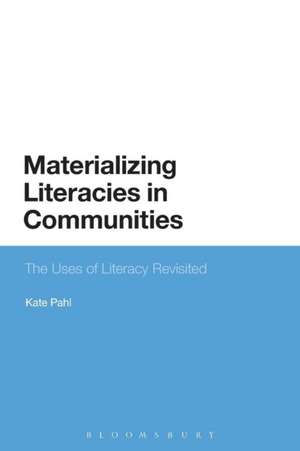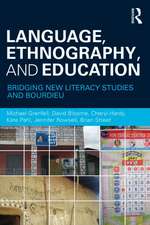Materializing Literacies in Communities: The Uses of Literacy Revisited
Autor Kate Pahlen Limba Engleză Paperback – 20 apr 2016
| Toate formatele și edițiile | Preț | Express |
|---|---|---|
| Paperback (1) | 256.49 lei 6-8 săpt. | |
| Bloomsbury Publishing – 20 apr 2016 | 256.49 lei 6-8 săpt. | |
| Hardback (1) | 948.75 lei 6-8 săpt. | |
| Bloomsbury Publishing – 22 oct 2014 | 948.75 lei 6-8 săpt. |
Preț: 256.49 lei
Preț vechi: 294.88 lei
-13% Nou
Puncte Express: 385
Preț estimativ în valută:
49.08€ • 52.48$ • 40.92£
49.08€ • 52.48$ • 40.92£
Carte tipărită la comandă
Livrare economică 17 aprilie-01 mai
Preluare comenzi: 021 569.72.76
Specificații
ISBN-13: 9781474283458
ISBN-10: 1474283454
Pagini: 224
Dimensiuni: 156 x 234 x 12 mm
Greutate: 0.31 kg
Ediția:NIPPOD
Editura: Bloomsbury Publishing
Colecția Bloomsbury Academic
Locul publicării:London, United Kingdom
ISBN-10: 1474283454
Pagini: 224
Dimensiuni: 156 x 234 x 12 mm
Greutate: 0.31 kg
Ediția:NIPPOD
Editura: Bloomsbury Publishing
Colecția Bloomsbury Academic
Locul publicării:London, United Kingdom
Caracteristici
Draws on interdisciplinary research to understand literacy as multimodal and materially and socially situated.
Notă biografică
Kate Pahl is Professor in Literacies in Education at the University of Sheffield, UK.
Cuprins
AcknowledgementsCopyright Acknowledgements1. Introduction2. Space3. Materiality4. Aesthetics5. Narrative6. Representation7. Futures8. MethodologyReferencesIndex
Recenzii
Pahl demonstrates a stunning ability to make the invisible visible. Through a complex network of interrelated narratives of children and ghosts, community stories, and abandoned and inhabited spaces, Pahl invites us to revisit, rethink, re-write and re-imagine what we know and how we make sense of our experiences as educators, as researchers, and ultimately as people.
Pahl's work expands and extends the oft-invoked conception of literacy as a "social practice." Through her research in neighborhoods, schools, and homes, she provides a persuasive and thoughtful exploration of the ways in which the daily reading and writing practices of people grow from - and perpetuate - specific histories, locations, and cultural contexts. She listens carefully to the stories people tell of their lived literacy experiences and, through theories of narrative and aesthetics, enriches our sense of how people encounter and imagine their identities and their communities. What's more, her use of participatory action research methodologies provides a compelling reminder of the need for researchers to collaborate with people in our communities to create knowledge and sustainable social change.
Bringing theories of material culture to literacy studies, Pahl shows us new ways of conceptualising and examining literacies in people's lives. Most importantly, perhaps, the book works ... as a 'provocation' or an 'alternate space of resistance', gently challenging the deficit assumptions about one town that underpin and are reinforced by statistics, and celebrating it as a creative, magical place of stories, textiles, singing, dancing, glitter and gold spangled elephants. The localised, everyday examples provided here present literacies as inevitably inflected by broad social, economic and political movements, but also entwined with memory and hope. The book is a powerful response to those that seek to de-humanise people and places for political purposes.
Space. Materiality. Aesthetics. Narrative. Representation. Futures.Each word taken separately bears the potential for a lifetime of inquiry. Kate Pahl holds them together in the universe of literacy practices in Rotherham, a community in the United Kingdom where she has located her inquiry for the last several years. As an ethnographer, Pahl embodies a research praxis that that hums in the key of empathy and she crafts evocative narratives that animate often hidden or overlooked nuances of meaning making involved in everyday interactions as young people interact with their material worlds. She expands New Literacy Studies research by putting forth a rich taxonomy of literacies embedded within everyday objects, actions, practices, and texts that have community relationships at the center.Pahl invites us to cultivate a responsive orientation toward communities in which literacies are thriving in unexpected and sometimes unlikely places. This is a book for readers and writers, for researchers and practitioners, and for those who bear a commitment to research as being generative of new knowledge, broadened ways of knowing, and increased access to knowledge-making processes.
Pahl is a truly committed ethnographer in the finest tradition. To a deep engagement with community she brings an impressive grasp of theory and a storyteller's skill at conveying lives. Read this book to understand how literacy, in its most inclusive sense, is put to work in communities and to learn, through example, what it means to be an engaged literacy scholar.
Pahl's work expands and extends the oft-invoked conception of literacy as a "social practice." Through her research in neighborhoods, schools, and homes, she provides a persuasive and thoughtful exploration of the ways in which the daily reading and writing practices of people grow from - and perpetuate - specific histories, locations, and cultural contexts. She listens carefully to the stories people tell of their lived literacy experiences and, through theories of narrative and aesthetics, enriches our sense of how people encounter and imagine their identities and their communities. What's more, her use of participatory action research methodologies provides a compelling reminder of the need for researchers to collaborate with people in our communities to create knowledge and sustainable social change.
Bringing theories of material culture to literacy studies, Pahl shows us new ways of conceptualising and examining literacies in people's lives. Most importantly, perhaps, the book works ... as a 'provocation' or an 'alternate space of resistance', gently challenging the deficit assumptions about one town that underpin and are reinforced by statistics, and celebrating it as a creative, magical place of stories, textiles, singing, dancing, glitter and gold spangled elephants. The localised, everyday examples provided here present literacies as inevitably inflected by broad social, economic and political movements, but also entwined with memory and hope. The book is a powerful response to those that seek to de-humanise people and places for political purposes.
Space. Materiality. Aesthetics. Narrative. Representation. Futures.Each word taken separately bears the potential for a lifetime of inquiry. Kate Pahl holds them together in the universe of literacy practices in Rotherham, a community in the United Kingdom where she has located her inquiry for the last several years. As an ethnographer, Pahl embodies a research praxis that that hums in the key of empathy and she crafts evocative narratives that animate often hidden or overlooked nuances of meaning making involved in everyday interactions as young people interact with their material worlds. She expands New Literacy Studies research by putting forth a rich taxonomy of literacies embedded within everyday objects, actions, practices, and texts that have community relationships at the center.Pahl invites us to cultivate a responsive orientation toward communities in which literacies are thriving in unexpected and sometimes unlikely places. This is a book for readers and writers, for researchers and practitioners, and for those who bear a commitment to research as being generative of new knowledge, broadened ways of knowing, and increased access to knowledge-making processes.
Pahl is a truly committed ethnographer in the finest tradition. To a deep engagement with community she brings an impressive grasp of theory and a storyteller's skill at conveying lives. Read this book to understand how literacy, in its most inclusive sense, is put to work in communities and to learn, through example, what it means to be an engaged literacy scholar.

